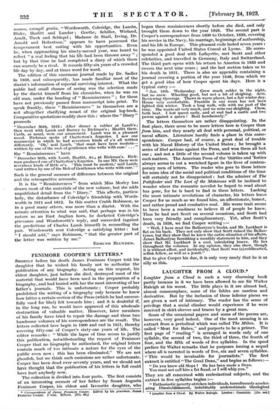FENIMORE COOPER'S LETTERS.*
SHORTLY before his death James Fenimore Cooper told his daughter that he wished his family not to authorize the publication of any biography. Acting on this request, his eldest daughter, just before she died, destroyed most of the material that would have been used in the preparation of a biography, and had buried with her the most interesting of her father's journals. This is unfortunate ; Cooper probably prohibited the writing of a biography only because he knew how bitter a certain section of the Press (which he had success- fully sued for libel) felt towards him ; and it is doubtful if, in the long run, he would have approved of this wholesale destruction of valuable matter. However, later members of his family have tried to repair the damage and these two handsome volumes of his correspondence are the result. The letters collected here begin in 1800 and end in 1851, thereby covering fifty-one of Cooper's sixty-one years of life. The editor remarks " While the lapse of time seems to justify this publication, notwithstanding the request of Fenimore Cooper that no biography be authorized, the original letters contain much of too intimate a nature for the eyes of the public even now ; this has been eliminated." We are not ghoulish, but we think such omissions are rather unfortunate. Cooper has been dead over seventy years, and we should not have thought that the publication of his letters in full could have hurt anybody now.
The collection is divided into four parts. The first consists of an interesting memoir of her father by Susan Augusta Fenimore Cooper, his eldest and favourite daughter, who
• correspondence of James Fenimore Cooper. Edited by his grandson. James Fenimore Cooper. 2 vols. Milford. [37s. W.]
began these reminiscences shortly before she died, and only brought them down to the year 1828. The second part is Cooper's correspondence from 1800 to October, 1838, covering his service in the Navy, his marriage, beginnings of authorship, and his life in Europe. This pleasant exile lasted seven years : he was appointed United States Consul at Lyons. He corre- sponded a good deal with Lafayette, met Scott and other celebrities, and travelled in Germany, Italy and Switzerland.
The third part opens with his return to America in 1888 and
covers the next nine years ; and the last section takes us to his death in 1851. There is also an appendix containing a journal covering a portion of the year 1848, from which we get a good idea of how Cooper spent his days. Here is a
typical entry :—
" Jan. 19th. Wednesday. Grew much colder in the night, but no snow. Wheeling good, but not a bit of sleighing. Acts. Reviewing Openings. Thaws in warm places, but a fair winter day. House very comfortable. Franklin in our room has not been lighted this winter. Took a long walk, wife with me part of the time. She wants air very much, and we miss our sleighing. Chess, both beat. I lost queen early, and at end had a castle and two pawns against a queen ! Beat handsomely."
The letters themselves are rather disappointing. In the first place, there seem to be more letters here to Cooper than from him, and they nearly all deal with personal, political, or naval affairs. Literature hardly finds a place in this corre- spondence. Cooper had, of course, a great deal of trouble with his Naval History of the United States ; he brought a
series of libel actions against the Press, and won them all but one ; and not a little of the second volume is taken up with such matters. The American Press of the 'thirties and 'forties always seems to cut a wretched figure in the lives of contem- porary men of letters. The reader who goes to these letters
for some idea of the social and political conditions of the time will certainly not be disappointed ; but the admirer of The Pathfinder and The Last of the Mohicans will be inclined to wonder where the romantic novelist he hoped to read about has gone, for he is hard to find in these letters. Lacking the more intimate revelations of character, his letters leave Cooper for us much as we found him, an affectionate, honest,
and rather proud and combative soul. His worse trait seems to have been a readiness to believe ill of people he knew.
Thus he had met Scott on several occasions, and Scott had been very friendly and complimentary. Yet, after Scott's death, in 1838, we find Cooper writing :-
"Well, I have read the Ballantyne's books, and Mr. Lockhart is flat on his back. They not only show that Scott ruined the Ballan- tynes, but they show that he knew the entire situation of his affairs, James Ballantyne furnishing a monthly statement to him, and they show that Mr. Lockhart is a cool, calculating knave. He lies throughout the volumes. In my opinion, they also show, though it is without effort, and incidentally, that gcott was (a) coldhearted, selfish fellow, as well as a Jesuit."
But to give Cooper his due, it is only very rarely that he is as silly as this.










































 Previous page
Previous page